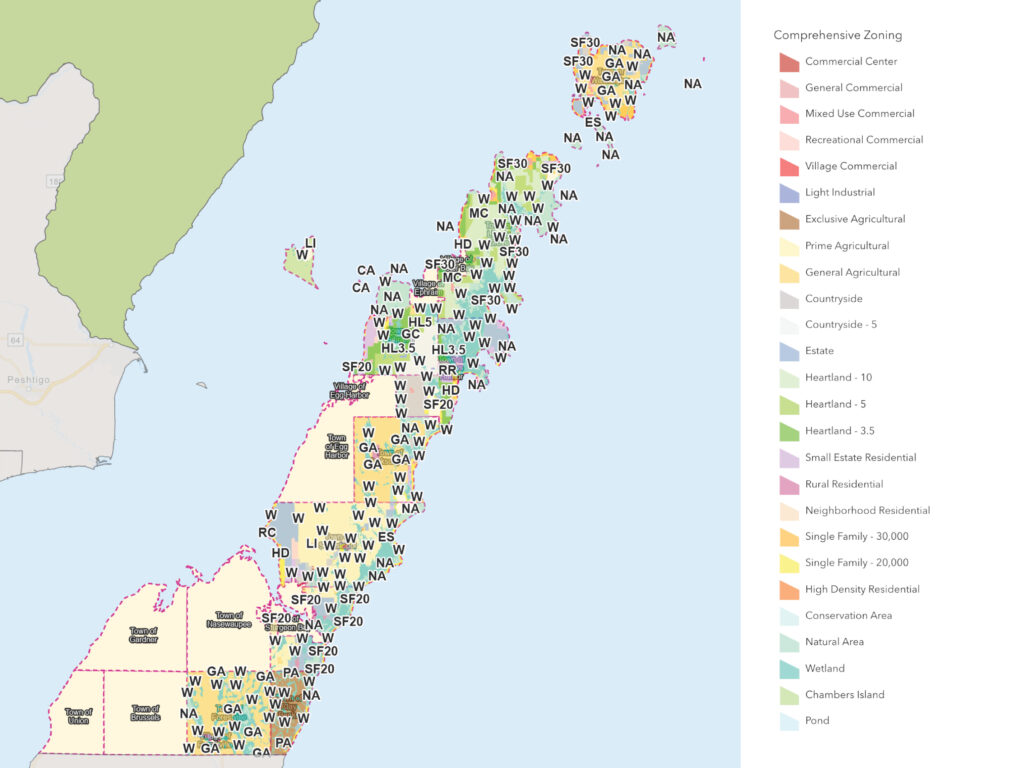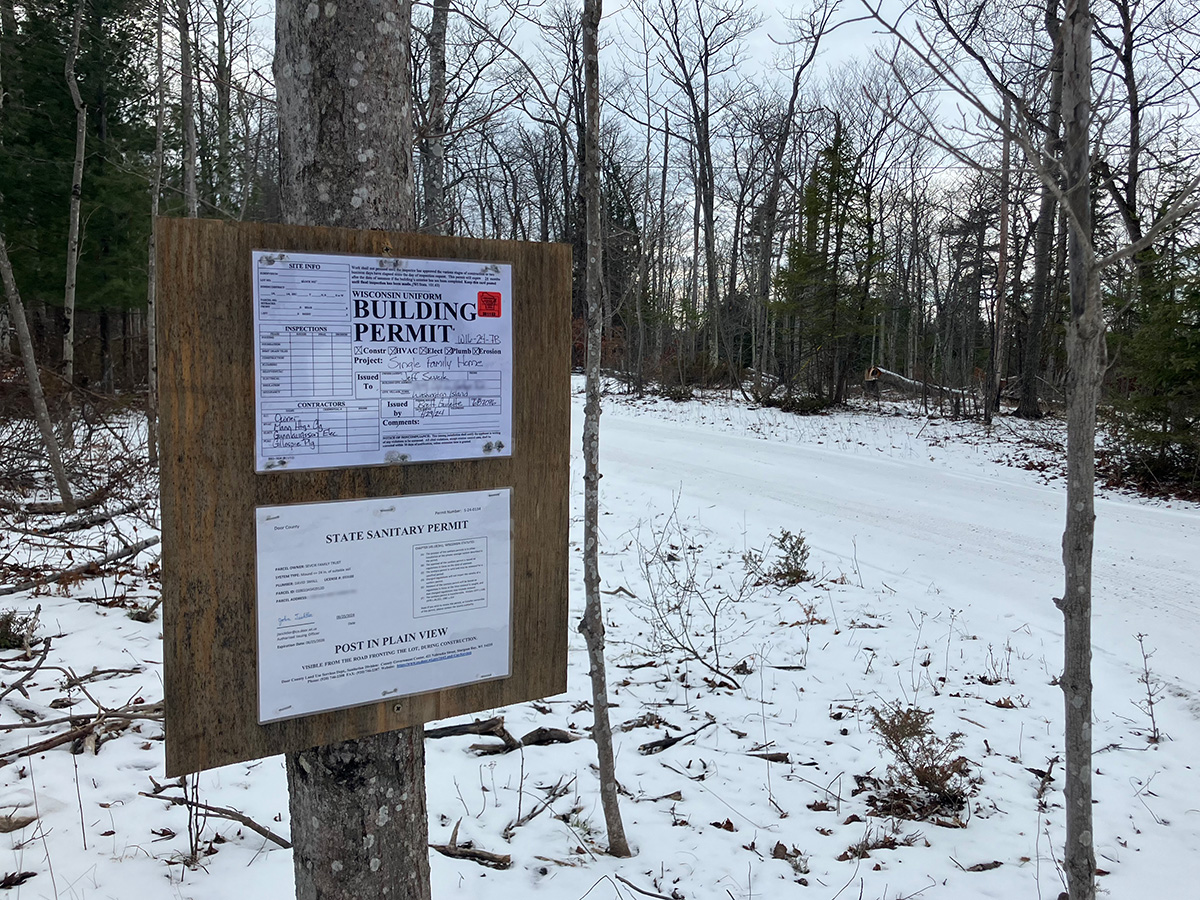The Door County Land Use Services department recently came under new leadership amid attempts to improve department operations and accountability during the past year. Director Mariah Goode left in November 2024.
Concerns about staff levels and workloads were raised by Goode, department employees and an oversight committee periodically since at least 2018. In 2023, the county Administrative and Finance committees commissioned a study of Land Use Services by BoldPath Consulting. The results of the study publicized enforcement backlogs, software issues and other “operational inefficiencies” in the department. A number of factors caused the problems, according to the study and meeting minutes.
Goode was department director for two decades, and interim replacement Karyn Behling has been at the helm since her departure. The county is still determining the best path for that position and whether Behling will remain beyond an interim period, County Administrator Ken Pabich said. Behling is an attorney who worked for the county Corporation Counsel between 2017 and 2022.
Pabich said there’s not an easy answer to why it took years of concerns and complaints and an outside study to address problems in the department. However, there were no concerns about department mismanagement, he said, and the motivating factor for commissioning the study was to get context around a request for additional staff from Goode.
“Was it just a matter of more staff needed or were there processes or ways to organize things differently before we made that investment?” Pabich said.
The study also was meant to determine whether things that were happening in the department were out of the ordinary compared to other counties and provide an understanding of the overall scope of permits and violations, he added.
The Land Use Services Department handles county zoning, sanitarian and planning responsibilities. The Resource Planning Committee oversees the department and the county Board of Adjustment conducts hearings regarding applications for variances from county zoning ordinances and appeals. Zoning responsibilities include processing regular and conditional use permit applications, which go to Resource Planning for public hearing and approval or denial.
Goode declined to comment on her departure, and Pabich would not comment specifically on details of her employment.
“With her (Goode’s) departure, we needed to find a different leader that would help us look at types of issues in terms of efficiencies, proficiencies, silos, dealing with technology and all that stuff to move us forward in that direction,” Pabich said in a phone conversation after the county Administrative Committee meeting on Jan. 21.
Meeting records from the past several years tell a story of a department plagued by unusually heavy workloads, inadequate staffing and technical glitches during a lengthy software transition. Dating back to 2018, there are at least 10 documented occurrences of Goode and members of the Resource Planning Committee expressing concern about staffing levels, workloads and software problems.

Timeline of concerns
In a June 6, 2023 memo to the county Administrative Committee, Goode requested funds to hire a fourth zoning administrator in 2024. She stated the department had four zoning administrators from 1996 to 2013 and when a senior administrator retired in 2013, the position was not filled.
Workloads started to significantly outpace staff levels in 2016, according to the memo, and during the Covid pandemic things got worse with an increase in construction and development pressure. Goode also indicated that a loss of institutional knowledge was a factor in departmental efficiency, with experienced staff leaving and new hires being relatively inexperienced in comparison.
“In 2013 our three zoning administrators had a combined tenure of over fifty years, while currently, our two newest zoning administrators only have 1.5 and 2.5 years’ experience here,” Goode wrote.
Additionally, according to the memo, four zoning administrators who retired or resigned between 2020 and 2023 indicated in exit interviews that their workloads were untenable.
Goode also reported in the memo that the department had received complaints over several years from the development community, property owners and towns about how long it was taking to process permits and respond to inquiries. Nine of Door County’s 14 towns operate under the county’s comprehensive zoning ordinance.
At least one example of these complaints is a February 2022 letter from then-Baileys Harbor Chair Don Sitte to the county stating the town had received numerous complaints about violations related to camping. He requested the county “enforce this ordinance as written in a timely matter.”
Goode also estimated in the memo that Land Use Services was about five years behind on conducting zoning permit compliance inspections.
At its July 2023 meeting, the Resource Planning Committee approved a recommendation to add a full-time zoning code administrator position to the 2024 budget with a fiscal impact of $104,252. If a full-time position was not possible, the oversight committee asked the Administrative and Finance committees to find funds for a two-year limited-term employee instead.
The position was not included in the 2024 budget. Pabich denied the request and recommended performing a study of the department “to (flesh) out the need for additional staff,” according to minutes from an October 2023 Administrative Committee meeting.
The county Administrative and Finance committees voted to hire BoldPath Consulting, based in Chilton, Wi., to perform a study of the department. The study cost an estimated $25,000, according to Pabich, and the results were released in January 2024.
BoldPath corroborated much of Goode’s June 2023 memo through staff interviews and surveys, records and meetings.
The study estimated there was a backlog of 400 reported violations and complaints and 5,000 to 6,000 certificates of compliance that had not been completed. A certificate of compliance is issued by a zoning administrator after determining that construction and/or land use indicated in a zoning permit are completed and are in compliance with the permit.
BoldPath made recommendations for remediating the department’s issues that included hiring two more full-time zoning administrators and prioritizing backlogged violations and certificates.
“At the current staff levels and ‘average’ levels of productivity, there is no hope for catching up,” according to BoldPath’s report.
History of department and software transitions
In 2017, three county departments–planning and zoning, sanitarian, and real property listing–merged to create what is currently the Land Use Services Department. Records show that the departments and their related workloads went from 18 staff members in 2007 to 11 in 2021.
In August 2021, Land Use Services launched a switch to City Squared/Municity software for online permitting and digital filing. In the department’s 2021 annual report, Goode referred to the software transition and stated, “Work to improve it and to clean up the data that was transferred in from the old system is still on-going, and will be for years to come.”
In a verbal report to the County Board at its March 2024 meeting, after BoldPath’s study was released, Goode said when the systems merged, some of the data was not “clean,” and that caused inconsistencies and redundancies. Department staff did not realize there was a problem until “some months later,” according to Goode, and she anticipated the problems being fixed by the end of summer 2024.
As a result of the BoldPath study’s recommendations, Goode was tasked with giving a status report for the department to the oversight and Administrative committees quarterly. According to the first and only such report from Goode in October 2024, most of the issues with software had been resolved and the department was able to enter data to provide accurate reporting.
Data confusion
According to Goode’s October report, from July 1 to Sept. 30, 2024, Land Use Services received 248 zoning applications and issued 209 permits. Open zoning permits, or incomplete certificates of compliance, that had originated in September 2016 through September 2023 were totaled at 4,389 and the department closed 526 of those, bringing the number down to 3,863.
BoldPath’s data showed there were 44 certificates completed out of 727 applications for all of 2023. The BoldPath study also determined that before 2013, the department averaged 474.7 completed certifications out of 648.9 permit applications.
After 2013, that average dropped to 189.6 completions out of 625.6 applications, indicating “the department's capacity has been stretched, pointing to a need for strategic intervention to address the growing backlog effectively,” according to the report.
There were also 220 backlogged complaints and violations as of September 2024, according to Goode’s report.
At the Resource Planning Committee meeting in October 2024, members indicated interest in getting more detailed data when available and more detailed information about the work processes related to tackling the backlog of violations and certificates, according to meeting minutes.
Based on Goode’s October report of 220 violations left open and BoldPath’s report of “roughly 400 known violations and complaints” eight months prior, it would appear the department made significant progress in clearing the backlog. That is not the case, however, according to Pabich.
“That was incorrect,” he said. “There’s never been 400 violations. I don’t think they (Land Use Services) had a good understanding of what was considered violations at the time (of the study).”
Not having a good understanding of the data or clear data has contributed to confusion about exactly how much backlog there is, but one thing that is clear is the backlog exists and must be addressed, Pabich said.
Most recent report
In Behling’s Jan. 21 report to the Administrative Committee, she gave the most current and available numbers regarding Land Use Services backlogs. Thirty percent of all open certificates of compliance, including the 2016-23 backlog and those created since then, have been closed, she said, for a total of 1,583 completed out of 5,343.
The easiest certificates to close were those that staff could assess without being physically on-site, using aerial views online to confirm whether things like accessory structures had been completed and within setbacks, she said.
“They can knock those off right from their offices,” she added.
Though the rate of completion may slow down now that the easier certificates are closed, Behling said, a lot of progress has been made in the past few months.
Behling said other new approaches have helped with clearing backlogs under her leadership, as well.
Some of those approaches reflect a March 2024 report by Goode to the County Board. In the report, Goode used BoldPath’s recommendations to outline plans for addressing backlogs. These plans included cross-training sanitarian staff to conduct zoning inspections on Washington and Chambers Islands, and zoning staff doing in-office issuance of permits using GIS aerial photography and other layers, when possible.
Pabich said it was unclear whether those plans were implemented effectively until now.
“Before, the strategy was one person was just dedicated to trying to work through those,” Behling explained to the Administrative Committee at their January meeting. “That's not a great way to handle it. So we're working as a team. Everybody's working on them.”
She gave an example of two code administrators traveling to Washington Island for a soil test recently. While they were there, they checked three violations and about a dozen certificates of compliance, Behling said.
Behling also said the department would be prioritizing backlogged violations. She reported that under her leadership Land Use Services has determined there are 232 violations to be addressed. She said she was confident in that number, as in the past couple months the department created a process for inputting and tracking violations in the City Squared/Municity software that it switched to in 2021.
“Now we'll be able to track their progress and see how they are moving about the system,” Behling said. “One of my goals was to implement a systematic approach on how we're going to handle violations, because I think it's really important for the department's integrity and responsiveness to keep on top of those.”
She also stated she would be handling violations personally and reporting on their status quarterly.
When the department transferred to the new software, it was not set up to be used for violations right away, according to Pabich. In the interim, the department was tracking violations on paper or using a digital spreadsheet program such as Microsoft Excel, he said.
By the end of February, Pabich said, a data dashboard for violations and certificates should be operational and will be categorized by those that are backlogged and those that are “new” since the system was set up. Numbers will fluctuate for a while, he added, because as certificates are completed and permits are investigated, more violations may be found.
“It may take a while to get this in balance,” Pabich said.
Big endeavors
Goode’s report to the County Board in March 2024 included a list of 37 department “projects (and) ’out of the ordinary’ activities” between 2006 and 2023. The list is composed primarily of projects from the planning, zoning and private onsite wastewater treatment systems – or POWTS – divisions or that significantly involved staff from those divisions, according to notes in the report.
The report lists major plan developments, ordinance revisions and rewrites, department mergers and affordable housing initiatives as some of the “out of the ordinary" projects undertaken by Land Use Services.
Additionally, “50 appeals, lawsuits, averted lawsuits, open records requests and controversial hearings” were handled by Land Use Services in that time period, compared to roughly 850 “regular” hearings, according to the document.
One of those lawsuits concerns Camp Zion in Ellison Bay. That particular case spans almost 20 years and involves several parties and federal courts. That case is an anomaly, according to Pabich, and he said he would disagree that the amount of zoning litigation the county is involved in is out of the ordinary.
However, as Land Use Services moves forward with enforcement of backlogged violations, that may change, he said.
“I think it's too early to tell,” Pabich said. “A lot of times we send a simple letter and people are cooperative and bring things into action, but I don't see right now a significant number of things that I would consider out of the ordinary.”
As far as ordinance revisions, in January 2021, Goode spearheaded a project to overhaul parts of the county’s comprehensive zoning ordinance. The project focused on the rules that govern what type of housing can be built and where, in order to encourage the development of affordable housing and remove unnecessary restrictions.
In March 2022, the County Board approved the changes, including decreasing minimum square footage requirements for many housing options, implementing less-restrictive permit processes for some housing options, and eliminating numerous town-specific regulations.
Additionally, under Goode’s leadership, Land Use Services helped launch the Door County Housing Partnership and an affordable housing student initiatives project. It participated in a Wisconsin Housing and Economic Development Authority pilot program and assisted in launching the Workforce Housing Lending Corporation. The department also led a county-wide housing study and an associated summit and four community presentations in 2019.
“She (Goode) really brought to the forefront many of the housing issues that we saw throughout the county,” Pabich said. “I find that very commendable and that's a great asset. And I'm glad that she's still in the county and still involved in those aspects.”
Land Use Services will be fully staffed soon, according to Behling, with two new zoning code administrators starting by mid-February. One of those positions is intended as a replacement for longtime zoning administrator John Teichtler, who is retiring in April. Teichtler has been with the department for 53 years.
Fully staffed means Land Use Services will have five zoning code administrators and one senior administrator, Pabich said, and staff will continue to be cross-trained. If there is a future resignation or retirement and the department is caught up on backlogs, the county may not need to refill the vacancy, he said.

